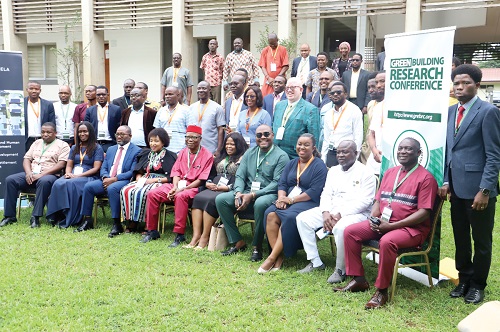The second iteration of the Green Building Research Conference is now taking place at the Noguchi Conference Hall on the campus of the University of Ghana, Legon. Attendees at this year’s event include researchers, academicians, legislators, and industry specialists from all across Africa.
The Applied Research Conference in Africa (ARCA) will be conducting a conference that will last for two days. The purpose of the conference is to provide participants with the opportunity to interact face-to-face in order to discuss new ideas and apply experiences, as well as to locate potential partners for future collaborative endeavours.
In addition to this, it seeks to garner support for the execution of the roadmap for Science, Technology, and Innovation for Sustainable Human Settlements (STI4SHS), and it also seeks to advance an African green building and development agenda.
Read also: Rwanda, UNEP, Others Secure Funding For Eco-Friendly Fridges, Air Conditioners
Green Building Research Conference
Prof. Joseph Nnamdi Mojeku, the Chairman of the ARCA Scientific Committee in Ghana, inaugurated the conference on Thursday of the previous week and stated that it had become necessary due to the detrimental repercussions of climate change and global warming all over the world.
He went on to explain that the duties of science, technology, and innovation in ushering in new environmentally friendly projects and sustainable human settlements were vital and linked with the United Nations Sustainable Development Goals (UN Sustainable Development Goals).
“I am pleased to announce that this conference is being held in collaboration with Nelson Mandela University, CSIR South Africa, the National Building Regulatory Commission, and the South African and Ghana Green Building Councils,” said the conference’s organiser, “all of which have been at the forefront of the struggle to advance African Green Building Development.”
Prof. Mojeku, who is also a lecturer in Social Statistics at the University of Lagos, went on to say that green buildings were energy efficient, resource-efficient, and environmentally responsible and that they were designed and built in accordance with green principles in order to lessen or eliminate the negative impacts on the occupants and the environment. Green buildings are responsible for reducing or eliminating the negative impacts on the occupants and the environment.
“It is my hope and belief that the conference communique will bring to the forefront solutions on how to advance an African green building initiative and development agenda in the areas of green buildings and environment as well as habitable human settlement in both rural and urban communities in Africa,” said Professor Mojeku. “This is my hope and belief.”
Government’s goal for Science, Technology, and Innovation
In a speech that was read on his behalf, Dr. Kwaku Afriyie, who is the Minister of Environment, Science, Technology, and Innovation (MESTI), stated that the purpose of the government is for Science, Technology, and Innovation to lead implementation efforts that are focused towards national ambitions.
The minister went on to state that Science, Technology, and Innovation had been pushed to the forefront of the country’s drive towards industrialization, becoming the pivot around which national development revolved. This was further explained by the fact that Science, Technology, and Innovation had been pushed to the forefront of the country’s industrialisation effort.
According to the statement, the President of the United States of America “believes that this should be the vision for the entirety of the continent of Africa.”
Ethiopian Startup Kubik secures $3.34M to build homes from waste
Advancing the State of Research
The minister also acknowledged the conversations that took place regarding how to encourage and strengthen research commercialization, publications, patents, technical transfer, ownership, market access, industry-science-academia relationship, and the sense of excellence in science.
“The good news is that our institutions have taken bold steps to ramp up efforts in these areas,” he added. “I am challenging academia, research, technology, and industry, which collectively make up the private sector,” to do more.




